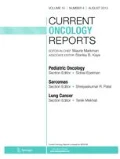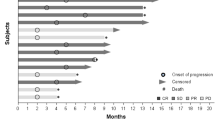Abstract
A growing body of evidence consistently demonstrates the activity of bevacizumab, a monoclonal antibody that targets all isoforms of vascular endothelial growth factor (VEGF)-A, in combination with chemotherapy in the treatment of patients with human epidermal growth factor receptor 2 (HER2)-negative, metastatic breast cancer. Clinical benefit has been limited to prolonged progression-free survival. As yet, combination regimens have failed to demonstrate a survival advantage. Emerging research suggests that single-nucleotide polymorphism in VEGF may predict response to combined therapy.
Similar content being viewed by others
References
Papers of particular interest, published recently, have been highlighted as: • Of importance •• Of major importance
Bergers G, Benjamin LE: Tumorigenesis and the angiogenic switch. Nat Rev Cancer 2003, 3:401–410.
Folkman J: Tumor angiogenesis: therapeutic implications. N Engl J Med 1971, 285:1182–1186.
Hicklin DJ, Ellis LM: Role of the vascular endothelial growth factor pathway in tumor growth and angiogenesis. J Clin Oncol 2005, 23:1011–1027.
Ellis LM, Hicklin DJ: VEGF-targeted therapy: mechanisms of anti-tumour activity. Nat Rev Cancer 2008, 8:579–591.
Cobleigh MA, Langmuir VK, Sledge GW, et al.: A phase I/II dose-escalation trial of bevacizumab in previously treated metastatic breast cancer. Semin Oncol 2003, 30:117–124.
Miller KD, Chap LI, Holmes FA, et al.: Randomized phase III trial of capecitabine compared with bevacizumab plus capecitabine in patients with previously treated metastatic breast cancer. J Clin Oncol 2005, 23:792–799.
Sledge GW, Miller K, Moisa W, Gradishar W: Safety and efficacy of capecitabine (C) plus bevacizumab (B) as first-line in metastatic breast cancer [abstract 1013]. Presented at the American Society of Clinical Oncology Annual Meeting. Chicago, IL; June 1–5, 2007
•• Miller K, Wang M, Gralow J, et al.: Paclitaxel plus bevacizumab versus paclitaxel alone for metastatic breast cancer. N Engl J Med 2007, 357:2666–2676. This article discusses the pivotal phase 3 clinical trial of bevacizumab in the metastatic population used in combination with paclitaxel chemotherapy
Miles D, Chan A, Romieu G, et al.: Randomized, double-blind, placebo-controlled, phase III study of bevacizumab with docetaxel or docetaxel with placebo as first-line therapy for patients with locally recurrent or metastatic breast cancer (mBC): AVADO [abstract 1011]. Presented at the American Society of Clinical Oncology Annual Meeting. Chicago, IL; May 30–June 3, 2008.
Robert NJ, Dieras V, Glaspy J, et al.: RIBBON-1: randomized, double-blind, placebo-controlled, phase III trial of chemotherapy with or without bevacizumab (B) for first-line treatment of HER2-negative locally recurrent or metastatic breast cancer (MBC) [abstract 1005]. Presented at the American Society of Clinical Oncology Annual Meeting. Orlando, FL; May 29–June 2, 2009.
Conlin AK, Hudis CA, Bach A, et al.: Randomized phase II trial of nanoparticle albumin-bound paclitaxel in three dosing schedules with bevacizumab as first-line therapy for HER2-negative metastatic breast cancer (MBC) [abstract 2009]. Presented at the American Society of Clinical Oncology Annual Meeting. Orlando, FL; May 29–June 2, 2009.
Motzer RJ, Hutson TE, Tomczak P, et al.: Sunitinib versus interferon alfa in metastatic renal-cell carcinoma. N Engl J Med 2007, 356:115–124.
Ratain MJ, Eisen T, Stadler WM, et al.: Phase II placebo-controlled randomized discontinuation trial of sorafenib in patients with metastatic renal cell carcinoma. J Clin Oncol 2006, 24:2505–2512.
Ebos JM, Lee CR, Cruz-Munoz W, et al.: Accelerated metastasis after short-term treatment with a potent inhibitor of tumor angiogenesis. Cancer Cell 2009, 15:232–239.
Paez-Ribes M, Allen E, Hudock J, et al.: Antiangiogenic therapy elicits malignant progression of tumors to increased local invasion and distant metastasis. Cancer Cell 2009, 15:220–231.
Yang B, Cross DF, Ollerenshaw M, et al.: Polymorphisms of the vascular endothelial growth factor and susceptibility to diabetic microvascular complications in patients with type 1 diabetes mellitus. J Diabetes Complications 2003, 17:1–6.
Shahbazi M, Fryer AA, Pravica V, et al.: Vascular endothelial growth factor gene polymorphisms are associated with acute renal allograft rejection. J Am Soc Nephrol 2002, 13:260–264.
Awata T, Inoue K, Kurihara S, et al.: A common polymorphism in the 5′-untranslated region of the VEGF gene is associated with diabetic retinopathy in type 2 diabetes. Diabetes 2002, 51:1635–1639.
Jin Q, Hemminki K, Enquist K, et al.: Vascular endothelial growth factor polymorphisms in relation to breast cancer development and prognosis. Clin Cancer Res 2005, 11:3647–3653.
• Schneider BP, Radovich M, Sledge GW, et al.: Association of polymorphisms of angiogenesis genes with breast cancer. Breast Cancer Res Treat 2008, 111:157–163. This retrospective cohort study of E2100 determined that SNPs in VEGF were associated with greater PFS and overall survival.
Disclosure
Dr. DeMichele has received research funding from Genentech for a clinical trial examining nab-paclitaxel with bevacizumab.
No further potential conflict of interest relevant to this article was reported.
Author information
Authors and Affiliations
Corresponding author
Rights and permissions
About this article
Cite this article
Keefe, S.M., DeMichele, A. The Expanding Role of Bevacizumab in the Treatment of Human Epidermal Growth Factor Receptor 2-Negative Breast Cancer. Curr Oncol Rep 12, 22–25 (2010). https://doi.org/10.1007/s11912-009-0080-9
Published:
Issue Date:
DOI: https://doi.org/10.1007/s11912-009-0080-9




